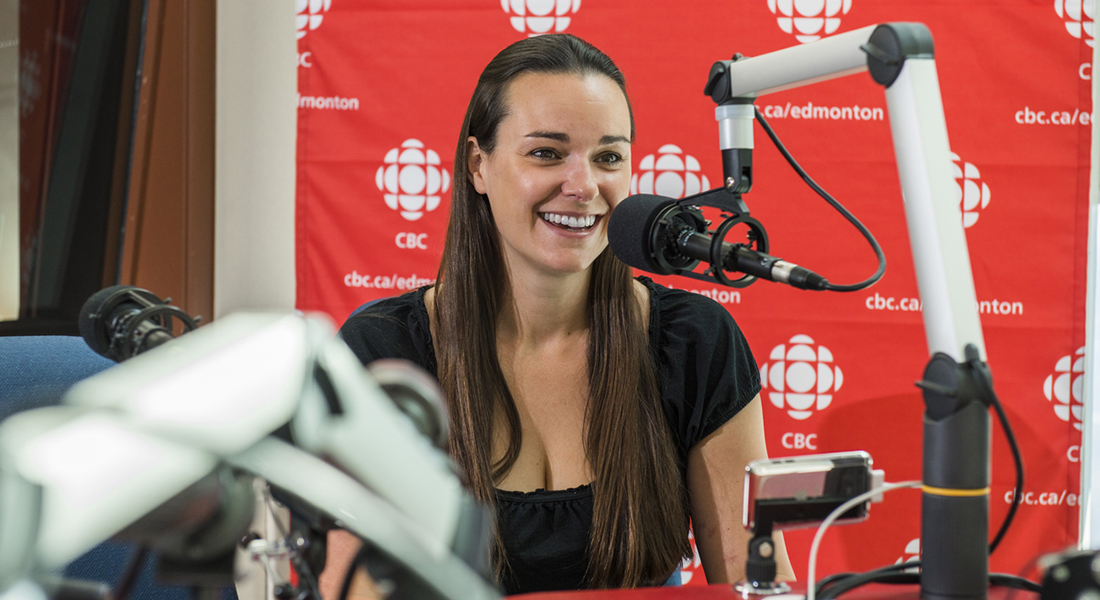
Photo: John Ulan
Not many scientists would call the director of NASA's Jet Propulsion Laboratory to ask how superheroes fly. Then again, Torah Kachur ('01 BSc, '08 PhD) isn't your everyday scientist. As a professor and science communicator, one of her core missions is to break the stereotype of the scientist in a white lab coat and engage the public with science. "Everybody needs a basic understanding of their bodies and their environments to interpret the news they hear every day," she says.
Kachur completed both her BSc and PhD in molecular genetics at the University of Alberta. While working toward her PhD, she became involved in outreach with the U of A's Women in Scholarship, Engineering, Science, and Technology (WISEST) program, which provides young girls exposure to career options in science and engineering. Her involvement with WISEST allowed her to share her research and passion for science with a broader audience.
On a whim, Kachur began to investigate careers in science communication and reached out to fellow alumnus Jay Ingram ('67 BSc, '09 DSc Hon.), past host of both CBC Radio's Quirks and Quarks and the Discovery Channel's Daily Planet. Ingram quickly became her personal mentor and opened the door for opportunities such as the Banff Science Communications program, a two-week retreat that brings together students, writers, and professionals from across Canada.
Her growing excitement, coupled with the friendships Kachur formed in graduate school, led to the birth of the blog and video channel Science in Seconds, which gave her and fellow creators Rheanna Sand ('02 BSc, '12 PhD) and Brittany Trogen ('08 BSc) an outlet to share their ideas and an opportunity to learn about a broad range of interesting science topics. "I loved the bench work and problem solving of grad school, but I also loved learning about the universe, viruses, the Large Hadron Collider-Science in Seconds was my motivation to learn."
"The value of a science degree, in her eyes, is measured not in knowledge, but in the ability to think critically and apply scientific principles to understand the world."
Upon completing her PhD, Kachur embarked on her teaching career, lecturing at both the U of A and MacEwan University. She now instructs multiple courses at both universities and teaches course review programs all across Canada. "Teaching allows me to selfishly learn so much about such a wide array of topics." Kachur also loves the constant exposure to different ways of teaching the same subjects.
One day, Kachur received a call from CBC Radio asking if she was interested in working as a science columnist. She learned that she had been recommended for the role by none other than Jay Ingram. "A week later, I'm in a radio studio, with no idea what I'm doing," Kachur recalls. Her first column was a seven-minute segment about a human fossil discovered in Indonesia. Kachur remembers recording the sequence more than 20 times and feeling like everything went wrong.
Since then, Kachur has hosted a series on the science of waste, guest hosted the award-winning national program Quirks and Quarks, and appeared as a science columnist on numerous local radio shows. While researching for her CBC superhero special Kapow! The Science and Technology of Super Powers, Kachur reached out to NASA to help her crack the secret of Superman's flying abilities. "Physicists," she learned, "are more than willing to take their science seriously in a ridiculous way."
Radio hasn't been an easy medium to master. In the classroom, Kachur uses pictures to communicate everything from relative size to complex details. On the air, words are the only tool at her disposal. One lesson she's learned has been simply to use active verbs and descriptions. "Science is really verb-less and adjective-less. Papers are good at conveying facts but not necessarily excitement."
Though her friends and colleagues may disagree, Kachur attributes much of where she is today to sheer luck. For example, she admits that she's never actually applied for a job-or even to graduate school, for that matter. After returning from four months of traveling, Kachur casually mentioned to her undergraduate research supervisor that she might be interested in continuing her studies. Less than a month later, her admission letter was in the mail.
Perhaps the biggest takeaway from Kachur's science education has been the importance of confidence. "I can learn and understand something that I thought was difficult or impossible when I first began."
Her advice for science students? "Don't learn for a job. It doesn't matter what you study, just that you study." The value of a science degree, in her eyes, is measured not in knowledge, but in the ability to think critically and apply scientific principles to understand the world.
Kachur is currently on maternity leave, caring for her daughter, Tate. She continues to guest lecture and is working on a pilot for a new radio show on unexplained mysteries solved by science.